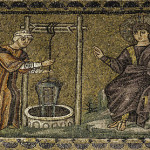We run our website the way we wished the whole internet worked: we provide high quality original content with no ads. We are funded solely by your direct support. Please consider supporting this project.
The Danger of the Penal Substitution View of Atonement
About 25 years ago I was traveling on the freeway to somewhere or other and I stopped at a truck stop to get a bite to eat. I sat down at the counter next to this scruffy truck driver who had just started his lunch, and we started up a friendly conversation. Within about fifteen minutes the man was bragging to me that he was strung out on cocaine, that he had had great sex with a girl he met in a bar the night before, that this sort of thing typically happened a couple times a week, and that his live-in girl friend of seven years pretends not to know about it because her two kids needed a dad. He seemed to think this was funny.
When he’d finished his colorful monologue, he asked me what I do for a living, to which I responded that I was a pastor.
His immediate response was, “Oh sh*t!”
He quickly apologized, telling me I didn’t look or act anything like the pastors he knew. “You should wear a collar or robe or something to warn people,” he said. I assured him I had no interest in judging him, since I myself am simply a forgiven sinner. I then told him he too could be forgiven and transformed by the love of God if he entered into a relationship with Jesus Christ. His response was rather interesting.
“Oh, I know about all that pastor,” he said. “I’ve already accepted Jesus as my savior.” “That’s great,” I said, trying not to sound surprised. “Yes sir,” he said. “My grandma had me go forward and pray the sinners prayer when I was five.” The trucker then explained that he gave up on religion in his early teenage years, but he never forgot that, because he’d accepted Jesus, “God doesn’t see my sin any more.” I inquired how that worked – an all-knowing God unable to see something. “God sees me through ‘Jesus spectacles!’” he exclaimed, almost in a southern preacher’s voice. “He doesn’t see my sin; he sees the blood of Jesus!”
This story illustrates my concern about how people often view salvation as a legal transaction. Most western Christians today understand the atonement as a sort of legal-transaction that took place between the Father and the Son and that got humanity “off the hook.” It usually gets explained like this:
God’s holiness demands that all sin be punished, which in turn requires that sinners go to eternal hell. The trouble is, God also loves sinners and doesn’t want them to go to hell. So, to resolve this dilemma, the Father sent the Son to suffer the penalty for our sin. On the cross God’s wrath against sin was vented on Jesus. So now when people believe in Jesus, their sin is forgiven and God declares them righteous. Now they can go to heave instead of hell. This view is usually referred to as the “Penal Substitutionary” view of the atonement.
Now, I know there are some verses that can be appealed to in support of this view (e.g. Isa 53; Rom. 3:25), though these passages can also be interpreted in other ways. But this aside, over the years I’ve become increasingly puzzled by this view. I don’t doubt for a second that Jesus died in our place and suffered the full consequences of our sin. I’m just unclear how we can say that God was venting his wrath on Jesus or how this would get us “off the hook.” It raises a lot of questions.
For example, if God demands that someone “pay the price” for sin before he forgives sinners, does God ever really forgive people their sins? If you owe me a hundred dollars and I hold you to it unless someone or other pays me the owed sum, did I really forgive your debt? Yes, you got off the hook. But forgiveness is about releasing a debt — not collecting it from someone else.
What really concerns me about this legal-transaction view, however, is that it seems to make the atonement something that changes God, not us. God allegedly vents his holy wrath against sin by punishing Jesus on the cross. And this somehow (I’ve honestly never understood this “somehow”) enables God to accept us. But this transaction between the Father and the Son leaves us just as we are. I find this troubling.
Now, neither I nor anyone else is in a position to judge the true nature of this man’s heart. All judgment belongs to God alone. But it seems to me there’s something a little screwy with any theology that convinces someone they have carte blanch permission to live however they want, without conviction, the rest of their life on the basis of a prayer they prayed when they were five!
My truck driver buddy may be a rather extreme example, but every study done on the subject has shown that the majority of professing Christians in America have something like this “God-doesn’t-see-my-sin” attitude. In sharp contrast to the faith of New Testament believers, the faith of most American Christians seems to make little or no impact on their life.
This is what the great German theologian Deitrich Bonhoeffer called “cheap grace.” We cheapen God’s grace when we see it as a legal thing that simply gets us “off the hook” rather than a divine power that transforms us from the inside out. We cheapen God’s grace when we see it as a forensic fiction that gets us out of jail for free but doesn’t transform us out of our criminal character. And the foundation for this cheap legal view of grace, I believe, is the legal transaction model of the atonement.
Category: General
Tags: Atonement, Forgiveness, Jesus, Kingdom Living, Penal Substitution View of Atonement, Sin, Transformation
Topics: Atonement and The Cross
Related Reading

The Cruciform Way of the Lamb
In this video, Greg offers insight into how to read the Bible with the cross at the center of the revelation of God, thereby reframing how we interpret the violent and nationalistic passages of the Old Testament. Travis Reed from The Work of the People did a series of interviews with Greg a while ago and…

Seeing and Knowing God
There are many scripture passages that seem to suggest that the way people view God often says more about them than it does about God. Our perception of God, as well as other spiritual truths, is conditioned by the state of our heart. Jesus’ most important teaching on this matter is found in John’s Gospel…

God is Different Than You Think
The revelation of “[a] God humiliated even unto the cross,” as Pascal put it, flies in the face of what most Jews of Jesus’ time, and of what most people throughout history, have expected God to be. In this light, we can discern the thematic centrality of the cross in Jesus’ many teachings that reverse…

The Holy Alternative
God is holy because he’s utterly “other” and distinct from anything in the created world. Certain objects are called holy because they’re set apart from common objects, having been consecrated to God for a special purpose. And God’s people are called to be holy by virtue of the radically different kind of life we live.…

A Foolish and Weak-Looking God
The New Testament assumes that the God of Israel and the God revealed in Jesus Christ are one and the same God. But there also can be no question that the portrait of God that was unveiled when the Messiah arrived on the scene was in some respects quite different from what the OT had…

Jesus Feminist
http://youtu.be/FBYELPZmdL4 Sarah Bessey’s book Jesus Feminist releases today. We’re so excited for her and for anyone who gets to read this book. She is first, and foremost a disciple of Jesus, and her embrace of feminism is inextricably wrapped in her identity as a disciple. Here’s a little snippet of something she’s written that beautifully…

